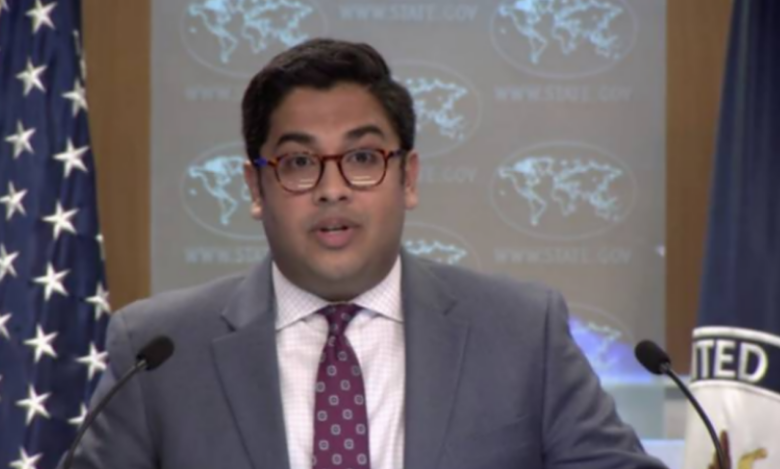Washington (Web Desk): Amid the ongoing tension surrounding India’s refusal to send its cricket team to Pakistan for the 2025 ICC Champions Trophy, the United States (US) has once again emphasized the significance of sports diplomacy in fostering deeper people-to-people connections.
The US stance comes as India continues to decline participation in the tournament, citing the strained political climate between the two nations.
In a press briefing on Thursday, US State Department Deputy Spokesperson Vedant Patel said this while responding to a question by a Pakistani correspondent about the Indian cricket board’s decision not to allow its team to travel to Pakistan for the prestigious international event.
The spokesperson, however, sidestepped providing a direct comment on the matter, explaining that such decisions fall within the realm of bilateral relations between India and Pakistan.
He pointed out that it was not for the US to weigh in on these issues, adding that India and Pakistan should engage with each other directly, whether through sports or other avenues.
Patel, however, reiterated the US Department of State's consistent emphasis on the power of sports as a diplomatic tool, particularly in the context of fostering human connections and strengthening relationships between countries.
“We’ve seen Secretary of State Antony Blinken and this department consistently highlight how sports can connect people across boundaries and help break down barriers,” Patel asserted during the daily briefing.
He further remarked that sports have a unique ability to bring people together from different walks of life and across nationalities, stressing that this is a core principle of the current US administration’s diplomatic agenda.
“At the end of the day, sports connect so many people, and it’s a great way to build those human-to-human and people-to-people ties that we have prioritized,” Patel concluded.
It is pertinent to mention that India’s decision to boycott the 2025 Champions Trophy has raised significant concern in both the sporting and political arenas.
The tournament, set to take place in Pakistan from February 19 to March 9, would have been the first time since the 2008 Asia Cup that India would have played in Pakistan.
Since the 2012-13 bilateral series, which was played in India, the two countries have not engaged in a formal cricket series.
The upcoming 2025 ICC Champions Trophy is facing uncertainty after India announced it would not send its team to Pakistan for the tournament.
The International Cricket Council (ICC) informed the Pakistan Cricket Board (PCB) last week about India’s decision, leaving the future of the event in doubt.
Pakistan had earlier rejected the idea of a "hybrid model," which would allow India to play its matches at neutral venues, such as the UAE, rather than in Pakistan.
In response to India’s refusal, the PCB has formally requested the ICC to clarify why India is unwilling to participate in the tournament in Pakistan.
The board has firmly expressed its position, aligning with the Pakistani government’s advisory, and rejected any arrangement where India’s matches would be played outside the country.
The PCB is determined to ensure that all Champions Trophy matches take place in Pakistan, insisting that it is crucial for the tournament’s legitimacy.
As per the sources close to the PCB, if India’s participation is important for the ICC’s revenue generation, then Pakistan’s role is equally significant.
They have pointed out that without the high-profile India-Pakistan matchups, the tournament’s financial viability could be at risk, as these games are a major draw for viewers and sponsors.
The fierce rivalry between the two countries consistently attracts large television and digital audiences, and any disruption to their participation could significantly impact the revenue from the event.
Amid these tensions, there are reports suggesting that Pakistan could consider boycotting ICC events in India altogether, citing concerns about the politicization of sports.
If Pakistan were to follow through with this threat, it could have serious consequences for the global cricketing landscape, as their absence would reduce viewership and weaken the financial returns from broadcasters and sponsors. The ICC, which has already secured $3.2 billion in broadcast rights for the 2024-2027 cycle, depends heavily on marquee matchups like India-Pakistan to generate substantial revenue.
The India-Pakistan encounters are among the most-watched in global cricket, with the 2023 World Cup match between the two teams drawing unprecedented numbers — 173 million viewers on Indian TV and another 225 million digital viewers.
These figures highlight the immense financial importance of these games for the ICC.
The ongoing dispute reflects the broader challenge the ICC faces in balancing the political dynamics between its member nations while ensuring the financial success of its major tournaments.


